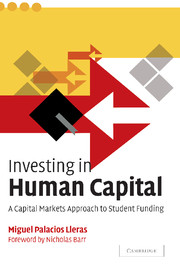Book contents
- Frontmatter
- Contents
- List of figures
- List of tables
- Foreword
- Acknowledgments
- Introduction
- Part I The problem of financing education
- Part II Equity-like investments to finance education
- Part III Implementing human capital contracts
- 8 Hurdles in the implementation of human capital contracts
- 9 Lessons from the implementation of income-contingent loans
- 10 Government-driven implementation of human capital contracts
- 11 Conclusion
- Appendix A Valuation of human capital contracts
- Appendix B Using human capital options to value income-contingent loans
- Appendix C Features of human capital contracts, income-contingent loans, and traditional mortgage-type loans
- Appendix D A developing country study
- Notes
- References
- Index
10 - Government-driven implementation of human capital contracts
Published online by Cambridge University Press: 08 January 2010
- Frontmatter
- Contents
- List of figures
- List of tables
- Foreword
- Acknowledgments
- Introduction
- Part I The problem of financing education
- Part II Equity-like investments to finance education
- Part III Implementing human capital contracts
- 8 Hurdles in the implementation of human capital contracts
- 9 Lessons from the implementation of income-contingent loans
- 10 Government-driven implementation of human capital contracts
- 11 Conclusion
- Appendix A Valuation of human capital contracts
- Appendix B Using human capital options to value income-contingent loans
- Appendix C Features of human capital contracts, income-contingent loans, and traditional mortgage-type loans
- Appendix D A developing country study
- Notes
- References
- Index
Summary
So far human capital contracts (HCCs) and human capital options (HCOs) have been described as instruments that can develop entirely from private initiatives. For this to happen, as considered in chapter 8, HCCs require developed financial markets and stable legal systems. Whereas those characteristics exist in some (not all) developed countries, a wide range of less developed ones is far from providing a solid institutional platform that can attract investors in HCCs. Furthermore, some developed countries with centralized higher-education systems, like the UK, might be interested in creating arrangements that permitted HCCs to fit within the higher-education sector. A pressing concern for all countries, whether developed or not, is the lack of resources to undertake the many responsibilities they carry. Creating the conditions for private investments in education is an alternative that permits an increase in education investments without tapping into the government's budget. This chapter presents some possible steps that governments could take to facilitate the availability of HCCs for their students.
Institutionalizing human capital contracts
Governments can aid the creation of HCCs by creating a legal infrastructure that takes away the uncertainty concerning the enforceability of the contract and the high costs involved in collecting payments. One such way consists of using the taxing capacity of the state to collect payments from students. Even though payments would be publicly enforced, the investment would still come from private sources. I shall call such an instrument here an “Institutional HCC.”
- Type
- Chapter
- Information
- Investing in Human CapitalA Capital Markets Approach to Student Funding, pp. 144 - 161Publisher: Cambridge University PressPrint publication year: 2004



